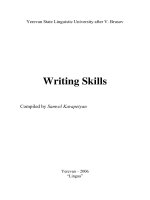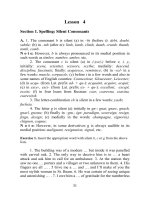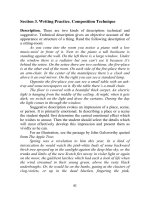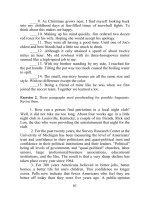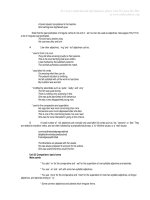Tài liệu Developing writting skills 2 part 4 pptx
Bạn đang xem bản rút gọn của tài liệu. Xem và tải ngay bản đầy đủ của tài liệu tại đây (164.87 KB, 10 trang )
30
TEXT 1
In a Tunisian Oasis
By Aldous Huxley
• What effects may deserts
have on people?
• Can you name some
deserts? Where are they
located?
1.
Waking at dawn, I looked out of the window. We were in the
desert. On either side of the railway an immense plain, flat as
Holland, but tawny instead of green, stretched out interminably. On
the horizon, instead of windmills, a row of camels was silhouetted
against the gray sky. Mile after mile, the train rolled slowly
southward.
2.
At Tozeur, when at last we arrived, it had just finished raining –
for the first time in two and a half years – and now the wind had
sprung up: there was a sandstorm. A thick brown fog , whirled into
eddies by the wind, gritty to the skin, abolished the landscape from
before our smarting eyes. We sneezed: there was sand in our ears, in
our hair, between our teeth. It was horrible. I felt depressed, but not
surprised. The weather is always horrible when I travel.
3.
Once, in a French hotel, I was accused of having brought with
me the flat black bugs, of whose presence among my bed-clothes I
complained to a self-righteous proprietress. I defended myself with
energy against the impeachment. Bugs – no: I am innocent of bugs.
But when it comes to bad weather I have to plead guilty. Rain, frost,
wind, snow, hail, fog – I bring them with me wherever I go. I bring
them to places where they have never been heard of, at seasons when
it is impossible that they should occur. What delightful skating there
31
will be in the Spice Islands when we arrive! On this particular
journey I had brought with me to every place on my itinerary the
most appalling meteorological calamities. At Naples, for example, it
was the snow. Coming out of the theatre on the night of our arrival,
we found it lying an inch deep under the palm trees in the public
gardens. And Vesuvius, next morning, glittered white, like Fujiyama,
against the pale spring sky. At Palermo there was a cloudburst.
“Between the Syrtes and soft Sicily” we passed through a tempest of
hail, lightening, and wind. At Tunis it very nearly froze. At Sousse
the wind was so violent that the stiff boardlike leaves of the cactuses
swayed and trembled in the air like aspens. And now on the day of
our arrival at Tozeur, it had rained for the first time in thirty month,
and there was a sandstorm. No I was not in the least surprised; but I
could not help feeling a little gloomy.
4.
Toward evening the wind somewhat abated; the sand began to
drop out of the air. At midday the brown curtain had been
impenetrable at fifty yards. It thinned, grew gauzier; one could see
objects at a hundred, two hundred yards. From the windows of the
hotel bedroom in which we had sat all day, trying – but in vain, for it
came through even invisible crannies – to escape from the wind
blown sand, we could see the fringes of a dense forest of palm trees,
the dome of a little mosque, houses of sun-dried brick, and thin
brown men in flapping nightshirts walking, with muffled faces and
bent heads, against the wind, or riding, sometimes astride, sometimes
sideways, on the bony rumps of patient little asses. Two professional
tourists in sun helmets – there was no sun – emerged round the
corner of a street. A malicious gust of wind caught them unawares;
simultaneously the two helmets shot into the air, thudded, rolled in
the dust. The two professional tourists scuttled in pursuit. The
spectacle cheered us a little; we descended, we ventured out of doors.
5.
A melancholy Arab offered to show us round the town.
Knowing how hard it is to find one’s way in these smelly labyrinths,
we accepted his offer. His knowledge of French was limited; so too,
in consequence, was the information he gave us. He employed what I
may call the Blitz method. Thus, when a column of whirling sand
rose up and jumped at us round the corner of a street, our guide
32
turned to us and said pointing “Poussiere
1
,”. We might have guessed
it ourselves. He led us interminably through narrow, many-cornered
streets, between eyeless walls, half crumbled and tottering.
“Village,” he explained. “Très plaisant.” We did not altogether agree
with him.
6.
A walk through an Arab village is reminiscent of walks through
Ostia or Pompeii. Roman remains are generally in a better state of
preservation, and cleaner; that is all. One is astonished to see, among
these dusty ruins, white-robbed families crouching over their repasts.
Our guide patted a brown mud wall. “Briques,” he said, and repeated
the word several times, so that we might be certain what he meant.
7.
The hotel is a long low building, occupying one whole side of
the market square. From your bedroom window you watch the Arabs
living; they do it unhurriedly and with a dignified inefficiency.
Endlessly haggling, they buy and sell. The vender offers a mutton
chop, slightly soiled; the buyer professes himself outraged by a price
which would be exorbitant if the goods were spotlessly first-hand. It
takes them half an hour to come to a compromise. On the ground
white bundles doze in the sun; when the sun grows too hot, they roll
a few yards and doze again in the shade. The notables of the town,
the rich proprietors of palm trees, stroll past with the dignity of
Roman senators. Their garments are of the finest wool; they carry
walking sticks; they wear European shoes and socks, and on their
bare brown calves – a little touch entirely characteristic of the real as
opposed to the literary East – pale mauve or shell-pink sock
suspenders.
8.
Walking among the crowds of the marketplace or along the
narrow labyrinthine streets, I was always agreeably surprised by the
apathetically courteous aloofness of Arab manners. There are
beggars in plenty, of course, hawkers, guides, cab drivers; and when
you pass, they faintly stir from their impassive calm. They stretch out
hands, they offer Arab antiquities of the most genuine German
manufacture, they propose to take you the round of the sights, they
invite you into their fly-blown vehicles. But they do all these things
politely and quite uninsistently. A single refusal suffices to check
their nascent importunity. You shake your head; they relapse once
1
“Poussiere”= “dust”
33
more into the apathy from which your appearance momentarily
roused them. Coming from Naples, we had been particularly struck
by this lethargic politeness. For in Naples the beggars claim an alms
noisily and as though by right. If you refuse to ride, the cabmen of
Pozzuoli follow you up the road, alternately cursing and whining,
and at every hundred yards reducing their price by yet another ten
per cent. The guides at Pompeii fairly insist on being taken; they cry
aloud, they show their certificates, they enumerate their wives and
starving children. As for the hawkers, they simply will not let you
go. What, you don’t want colored photographs of Vesuvius? Then
look at these corals. No corals? But here is the last word in cigarette
holders. You don’t smoke? But in case you shave; these razor blades,
now … You shake your head. Then toothpicks, magnifying glasses,
celluloid combs. Stubbornly you continue to refuse … Self-help and
strenuous life do not flourish on the other shore of the
Mediterranean. In Tunisia the tourist walks abroad unpestered. The
Arabs have no future.
9.
That they might still have a future if they changed their
philosophy of life must be obvious to anyone who has watched the
behavior of Arab children, who have not yet had time to be
influenced by the prevailing fatalism of Islam. Arab children are as
lively, as inquisitive, as tiresome, and as charming as the children of
the most progressively Western people. The adult beggars and
donkey drivers might leave us in peace; but the children were
unescapable. We could never stir abroad without finding a little troop
of them frisking around us. It was in vain that we tried to drive them
away; they accompanied us, whether we liked it or no, on every
walk, and when the walk was over, claimed wages for their
importunate fidelity.
10.
Under the palm trees, through that labyrinth of paths and
running streams, we wandered interminably with our rabble of little
guides. A fertile oasis possesses a characteristic color scheme of its
own, which is entirely unlike that of any landscape in Italy or in
north. The fundamental note is struck by the palms. Their foliage,
except where the stiff shiny leaves metallically reflect the light, is a
rich blue-green. Beneath them, one walks in a luminous aquarium
shadow, broken by innumerable vivid shafts of sunlight that scatter
gold over the ground or, touching the trunks of the palm trees, make
34
them shine a pale ashy pink. Under the palms, beside the brown and
jade-colored water, glows the bright emerald green of corn or the
deciduous trees of the north, with here and there the huge yellowish
leaves of a banana tree, the smoky gray of olives, or the bare bone-
white and writhing form of a fig tree.
11.
As the sun gradually sinks, the aquarium shadow under the palm
trees grows bluer, denser; you imagine yourself descending through
layer after darkening layer of water. Only the pale skeleton of the fig
trees stand out distinctly; the waters gleam like eyes in the dark
ground.; the ghost of a little marabout or chapel shows its domed
silhouette, white and strangely definite in the growing darkness,
through a gap in the trees. But looking up from the depths of this
submarine twilight, one sees the bright pale sky of evening, and
against it, still touched by the level, rosily golden light, gleaming as
though transmuted into sheets of precious metal, the highest leaves
of the palm trees.
12.
A little wind springs up; the palm leaves rattle together; it is
suddenly cold. “En avant
1
” we call. Our little guides quicken their
pace. We follow them through the darkening mazes of the palm
forest, out into the open. The village lies high on the desert plateau
above the oasis, desert-colored, like an arid outcrop of the tawny
rock. We mount to its nearest gate. Through passageways between
blank walls, under ling dark tunnels the children lead us – an obscure
and tortuous way which we never succeeded in thoroughly mastering
– back to the square marketplace at the center of the town. The
windows of the inn glimmer invitingly. At the door we pay off the
captains of industry; we enter. Within the hotel it is provincial
France.
1
“En avant”= “March on”


